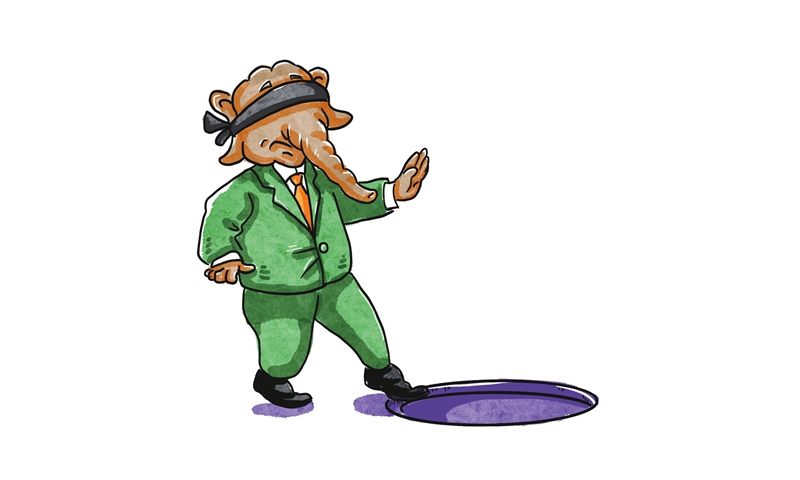Chellaney and the like are turning India into second Australia on an anti-China path

Illustration: Tang Tengfei/GT
There is a segment of the Indian scholars that has been constantly barking over China-related issues. They have repeatedly shown to the world their low political IQ - they push India to the forefront of the anti-China campaign, wishing to turn the country into a second Australia. Their pretentious and far-fetched logic to drive a wedge between China and the rest of the world is laughable.Brahma Chellaney, who has gone even further than most anti-China Americans, is one of those Indians - and he is almost lost in such paranoia. He published Tuesday on The Times of India an article entitled "India must give Taiwan a helping hand." He then tweeted that the island of Taiwan plays "an indirect role in the defense of India," and that if China realizes reunification, "India's security will come under greater pressure." Clearly, he views the island of Taiwan as a tool for his professional anti-China career.
Nevertheless, Chellaney's provocative statements of the one-China principle do not represent the Indian government's policies over Taiwan. In contrast, in terms of the one-China principle, India hasn't changed its stance for decades since the founding of the People's Republic of China in 1949.
Zhao Gancheng, a research fellow at the Shanghai Institute for International Studies, told the Global Times, "Even after the border war in 1962, India supported the restoration of PRC's lawful UN seat. Adhering to the one-China principle is the profound basis of India's China policy, and this hasn't shown any sign of budging."
Although the Centre for Policy Research, where Chellaney works, has a relatively close relationship with the Indian government, Chellaney's remarks linking India's national defense with the island of Taiwan are no more than far-fetched. A saying goes that an enemy's enemy is a friend. But such talk is not enough to get the Indian government to change its mind on the one-China principle.
If India publicly goes against the one-China principle, and even endorses the secessionist forces on the island of Taiwan, China's response will certainly be detrimental to India's long-term national interests - as China then will have every reason to fight fire with fire.
As Long Xingchun, president of the Chengdu Institute of World Affairs, previously told the Global Times, "Taiwan secessionist forces and Indian separatists are in the same category. If India plays the Taiwan card, it should be aware that China can also play the Indian separatist card… If India's nationalists move forward by fanning the Taiwan flame, what awaits them will be insurgence and chaos in its northeast."
It is a tragedy for India that so many so-called scholars and media experts cannot see the situation clearly while thinking themselves clever.
India's relations with the island of Taiwan grew rapidly in the past few years. The two sides are also discussing bringing a chip plant to India. New Delhi has offered financial support of 50 percent of capital expenditure from 2023 as well as tax breaks and other incentives. From this perspective, sowing discord is a move of Indian media to try to bring the island of Taiwan closer, despite the fact that India's lagging infrastructure is not attractive.
Indian broadcaster Doordarshan was the first to release that Slovenia may be joining Lithuania over the Taiwan question. Slovenian Prime Minister Janez Jansa told the outlet in his Monday interview that he was following other European nations in establishing a representative office of the island of Taiwan. Meanwhile, Jansa said that the office "will not be on the level of embassies."
The media and scholars think they have made a smart move by using Taiwan island as a tool to contain China, and provoking China with Taiwan-related rhetoric. But for India, which is far less powerful than China, this would do more harm than good.
As a matter of fact, some Indians see Taiwan as a card or tool. They have the same thinking as the US but don't possess the same strength. Besides, India cannot command Taiwan and it cannot provide substantial benefit to the island. The Indian media and scholars should be alert to the consequence of shooting themselves in the foot.
Regarding the island of Taiwan as a shield for India's defense, Chellaney apparently doesn't care about the future of this "democratic success story." What he cares about is how he can do better on the anti-China path to gain both fame and money.
The Indian government should be careful not to be taken into the gutter by this kind of sensational nonsense.
The author is a reporter with the Global Times. opinion@globaltimes.com.cn

